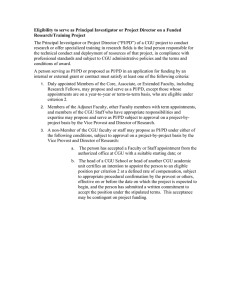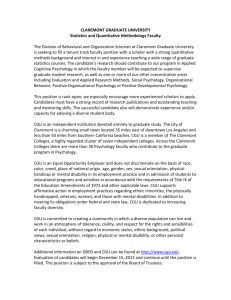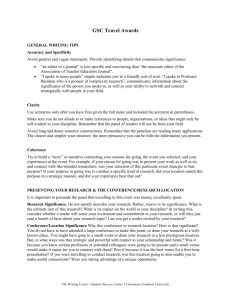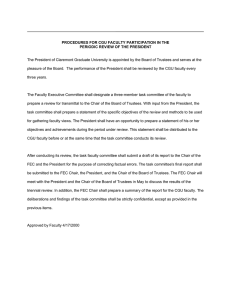I. Guidelines for Non-degree Programs 1. Purpose
advertisement
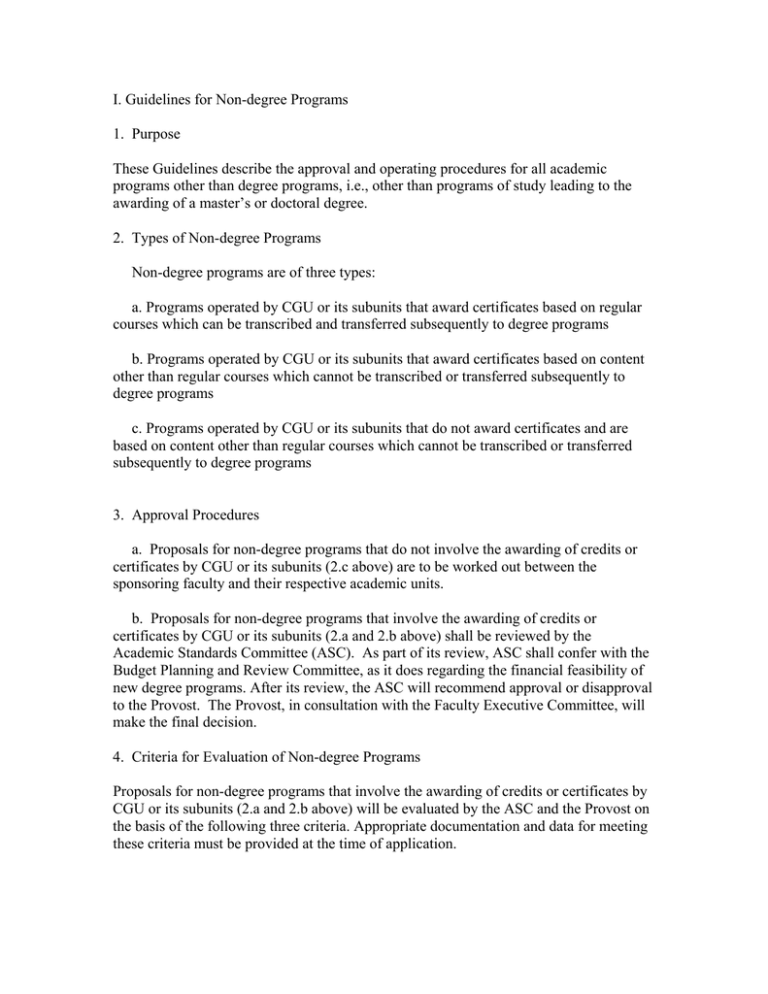
I. Guidelines for Non-degree Programs 1. Purpose These Guidelines describe the approval and operating procedures for all academic programs other than degree programs, i.e., other than programs of study leading to the awarding of a master’s or doctoral degree. 2. Types of Non-degree Programs Non-degree programs are of three types: a. Programs operated by CGU or its subunits that award certificates based on regular courses which can be transcribed and transferred subsequently to degree programs b. Programs operated by CGU or its subunits that award certificates based on content other than regular courses which cannot be transcribed or transferred subsequently to degree programs c. Programs operated by CGU or its subunits that do not award certificates and are based on content other than regular courses which cannot be transcribed or transferred subsequently to degree programs 3. Approval Procedures a. Proposals for non-degree programs that do not involve the awarding of credits or certificates by CGU or its subunits (2.c above) are to be worked out between the sponsoring faculty and their respective academic units. b. Proposals for non-degree programs that involve the awarding of credits or certificates by CGU or its subunits (2.a and 2.b above) shall be reviewed by the Academic Standards Committee (ASC). As part of its review, ASC shall confer with the Budget Planning and Review Committee, as it does regarding the financial feasibility of new degree programs. After its review, the ASC will recommend approval or disapproval to the Provost. The Provost, in consultation with the Faculty Executive Committee, will make the final decision. 4. Criteria for Evaluation of Non-degree Programs Proposals for non-degree programs that involve the awarding of credits or certificates by CGU or its subunits (2.a and 2.b above) will be evaluated by the ASC and the Provost on the basis of the following three criteria. Appropriate documentation and data for meeting these criteria must be provided at the time of application. a. The Need for the Program The need may include, although not limited to, one or more of the following objectives: (1) To promote unit/CGU’s strategic mission and/or reputation. (2) To move existing students up to a higher-level program (e.g., from noncertificate to certificate, from certificate to degree), or add desirable competencies to existing students. (3) To attract new students, or test-market a new degree program. (4) In association with (1), (2), and/or (3) above, to generate additional revenue. Appropriate evidence may include one or more of the following: references to the relevant sections of the CGU mission statement, projected market studies, revenues, and assessment of current reputation and plans for marketing the program to those who judge reputation. b. Provisions for Quality (1) Indication of the academic/administrative unit of CGU directly responsible for the design and administration of the program, with the name of the faculty member to serve as the first program coordinator and names of the program coordinating committee responsible for the program, which may coincide with the unit’s existing executive committee. In case of a cooperative program with other units of CGU or other institutions, the application should list the coordinator and members of the program coordinating committee responsible for the program. In case of a cooperative program with other institutions, a substantial portion of the membership of the committee (at least one third to one half) must come from core CGU faculty. Likewise, a core CGU faculty member will normally be the coordinator of the program and chair the coordinating committee. (2) Letters of support from participating academic programs. (3) Proposed curriculum and requirements. (4) List of participating faculty with current c.v.’s. (5) Comparison of program structure and content with similar programs in the region and nation. c. Impact Analysis New programs will have a variety of impact on CGU. The proposer of a new program should analyze the program’s potential impacts in the following areas, and explain how the benefits of the program outweigh any negative impacts. (1) A financial plan for the first three years of operation, including an analysis of the program’s financial impact on CGU, e.g., costs borne by CGU not offset by additional revenues to CGU or contributions to CGU specifically earmarked for the program. If the program involves more than one unit or one institution, the proposer should explain how the revenues and costs of the program will be apportioned. If tuition aid is to be offered, 2 sources and impacts are to be discussed. (2) Impact on programs and faculty. New programs may draw students and faculty away from existing CGU programs and impose additional workload on the faculty. (3) Negative impacts of the discontinuance of the program. 5. General Operation a. Each program will have a coordinator whose responsibility is to manage the routine administration of the program. b. Each program will have a coordinating committee that bears ultimate responsibility for the design and administration of the program and that meets as often as the need arises. It will be chaired by the program coordinator. 6. Decennial Program Reviews a. Programs managed by a single CGU department or unit will undergo the decennial review as part of the decennial review of the department or unit. b. Other programs will receive their decennial reviews as part of the decennial review of their cooperating school or schools. c. The criteria for evaluation in Sec. 4 shall also serve as criteria for the decennial review to evaluate the performance of the program during the preceding ten years on each of the three criteria. 7. The provisions of Sec. 3 (Approval Procedures) and 4 (Criteria for Evaluation) shall apply only to new applications for non-degree programs. The provisions of Sec. 5 (General Operation) and 6 (Decennial Program Reviews), however, shall apply to all programs, old and new. NON-DEGREE PROGRAMS PROGRAM PROPOSAL FORM Proposals for non-degree programs must include the following information: 1. Program Title: 2. Responsible CGU Unit(s), Prospective Program Coordinator and Coordinating Committee Members: (cf. 4b(1) and 5a,b of “Guidelines for Non-degree Programs”) 3. Credits/Certificates to be Awarded (what kind of certificate and how many credit units of what type will be awarded? Can the credits be applied toward a CGU degree?): 4. Brief Program Description (objective, target market, curriculum, courses, faculty, administration, tuition, marketing plan): 3 5. Documentation and Data for Meeting the Evaluation Criteria (the need for the program, provisions for quality, and impact analysis)(Cf. Sec. 4 of “Guidelines”): Endorsements [cf. 4b(1) & (2)]: Responsible CGU Department Chair Signature _____________________ Date_________________ Responsible CGU Dean/Director Signature _____________________ Date_________________ Prospective Program Coordinator Signature _____________________ Date_________________ Other Relevant CGU Deans/Directors/Chairs and Faculty Members Signature _____________________ Date_________________ Chair, Academic Standards Committee Signature _____________________ Date_________________ Chair, Faculty Executive Committee Signature _____________________ Date_________________ Provost Signature _____________________ Date_________________ (Final approved by ASC 12/2009, by FEC on 01/2010; by Faculty 5/2010) __________________ *Original guidelines 2000; *Revised 2010 due to inconsistencies and contradictions in the language that made its application problematic and unreliable over time; 4
